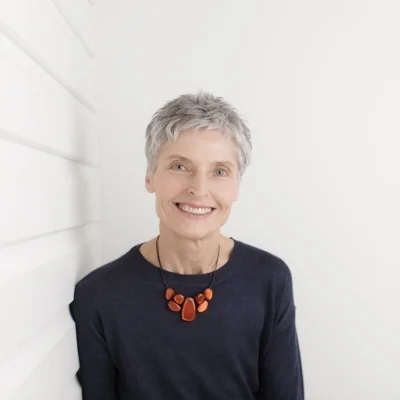Domini, 63
Author, journalist, public speaker & breast cancer survivor, SYDNEY
Author, journalist and public speaker Domini Stuart was diagnosed with breast cancer in 1999 and received treatment for the next five years. Today, she draws on her experience to help other women cope with similar challenges and then to stay well.
Domini has written a book, You can get through this! How to stay positive when you’re coping with breast cancer, and works closely with Breast Cancer Network Australia as a consumer representative on the organisation’s ‘Seat at the Table’ program.
This is her story.
Domini has a family history of breast cancer, so she started having regular checks and mammograms when she was in her early forties. But, for some reason, her lump was particularly hard to find.
“But the time it could be detected, it was large and the lymph nodes under my arm were already affected,” Domini said.
“I have to admit that scared me. But what scared me even more was the fact that both my mother and grandmother died from cancer when they were 48. I was 47 and three-quarters.
“I don’t think many women would have been as excited as I was to wake up and discover it was my 49th birthday, said Domini.
Domini found the lump close to Christmas in 1999.
“Everyone was on holiday, so I had to wait until early January for a final [breast cancer] diagnosis,” she said.
“I think the uncertainty was the hardest thing to deal with. Once I was sure, I could get on with preparing for what would happen next.”
That included breaking the news to her four children, who were then aged between nine and 16.
“I didn’t want to make false promises. I really had no idea whether I would survive,” said Domini.
“So I did the best I could, which was to promise that I would do everything I could to stay alive.”
Domini’s initial treatment plan was to undergo surgery, followed by chemotherapy and radiotherapy.
“I wanted a double mastectomy, but not for the usual reasons. I wasn’t thinking about whether I might get cancer in the other breast,” Domini said.
“I’ve always been a jeans and T-shirt kind of person and in my heart, I knew that leaving hospital braless, wearing a T-shirt and feeling flat but symmetrical, would give me the best possible chance of coping emotionally.
“In most cases, this wouldn’t be an option, for surgeons know there’s a good chance that people can come to regret a decision made at such a stressful time. But, in my case, there were enough concerns about changes in the ‘healthy’ breast for my surgeon to agree,” said Domini.
Radiotherapy sandwiched between two courses of chemotherapy meant Domini was bald for almost a year.
“Losing our hair is one of the most traumatic things women [living with breast cancer] have to cope with,” Domini said.
“I bought a wig but never wore it. I didn’t even wear a scarf or hat, apart from a beanie when I was cold.
“Facing the world with a bald head made me feel courageous and strong – a reminder that I could stare down my worst demons,” said Domini.
First-line treatments were followed by five years on oral medications, tamoxifen followed by anastrozole.
“Both of these drugs can help to reduce the risk of breast cancer returning,” Domini said.
“I think it’s very exciting that For Benefit Medicines plans to reinject 100 per cent of the profits that they make from this kind of medication into local patient support and medical research organisations.
“It’s a completely new approach to pharmaceuticals that offers benefits beyond the impact of the drugs themselves,” said Domini.

